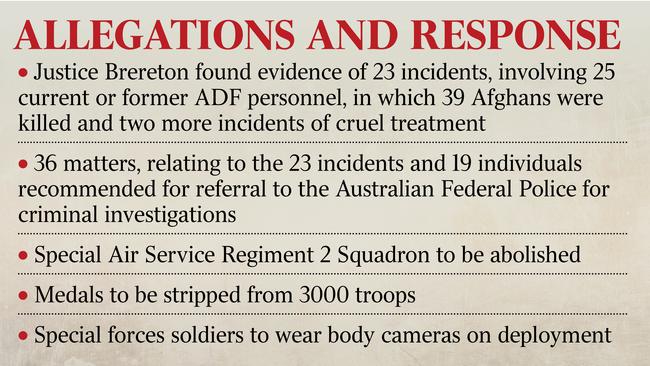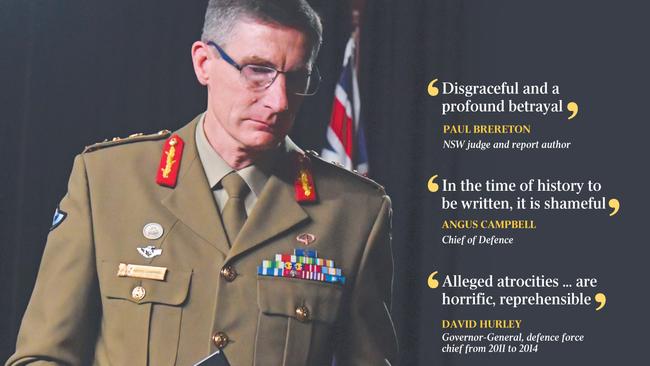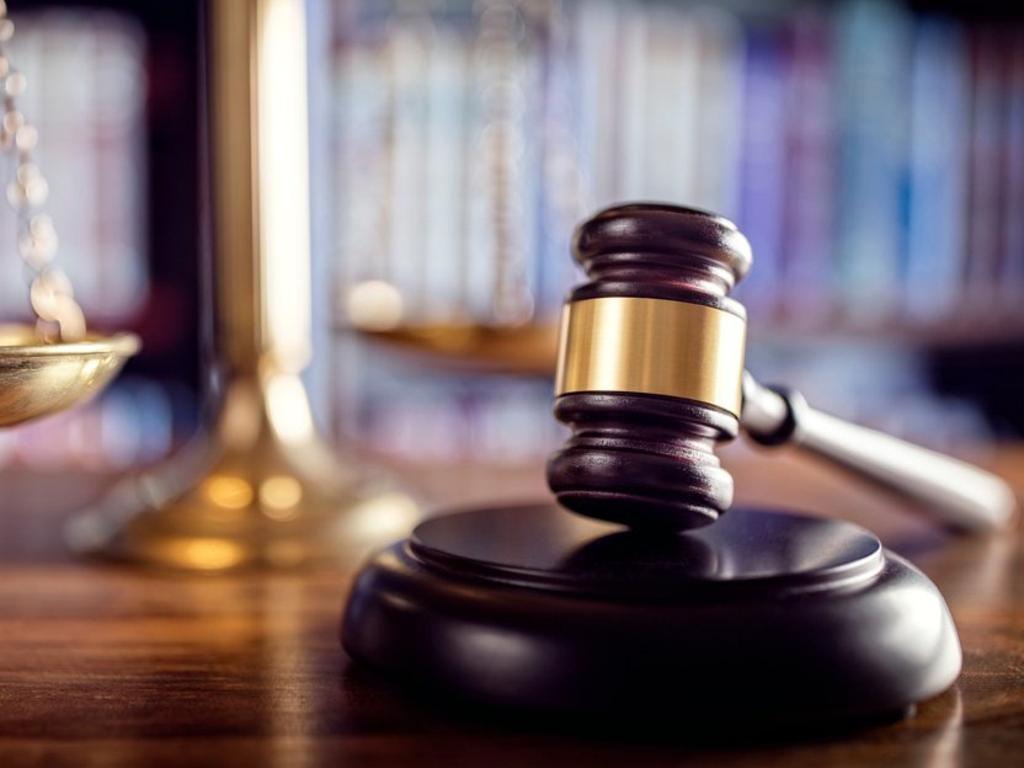Brereton war crimes report: Defence urges probe into 19 soldiers over 39 alleged murders
Special forces soldiers are accused of murdering 39 Afghans in the most shameful chapter in Australia’s military history.

Australian special forces soldiers are accused of murdering 39 Afghan civilians and prisoners, and of “blooding‘’ new recruits by forcing them to shoot unarmed detainees, in the most shameful chapter in the nation’s military history.
A four-year investigation by NSW Supreme Court judge Paul Brereton found “credible information” that up to 25 serving and former soldiers were involved in — and covered up — alleged war crimes in Afghanistan during the nation’s longest war, and recommended 19 face criminal investigations.
“What this report discloses is disgraceful and a profound betrayal of the Australian Defence Force’s professional standards and expectations,’’ Justice Brereton said.
He found credible information of 23 incidents of unlawful killing — some involving more than wrongful death — and a further two incidents of alleged “cruel treatment” of non-combatants.
Among the findings were credible reports that junior soldiers were ordered by patrol commanders to shoot unarmed prisoners to achieve their first kill in a practice known as “blooding”; and that “throwdowns” — weapons or radios planted on bodies — were used by soldiers to conceal murders.

Defence Force Chief Angus Campbell announced the abolition of the most notorious squadron in the SAS, stripped medals from more than 3000 troops who had served in Afghanistan, and said all special forces soldiers in future would have to wear body cameras when on deployment.
He apologised “unreservedly’’ to the people of Afghanistan for wrongdoing by Australian soldiers and signalled the government would pay compensation.
Justice Brereton found the alleged crimes were “commenced, committed, continued and concealed” by corporals and sergeants in the field over the period 2009-13, but the commanders that led them shared moral responsibility for what occurred.
He said the future of these officers would be reviewed on a case-by-case basis’.
The names of personnel believed to have committed crimes were redacted from the publicly released report, along with key details of incidents, in order to safeguard future prosecutions.
One heavily redacted incident is described as “possibly the most disgraceful episode in Australia’s military history”. However details of the incident may not be known for years as prosecutions proceed through the courts. Scott Morrison, has announced a new special investigator will prepare war crimes prosecutions.
On Thursday the Prime Minister assured veterans and ADF personnel the government would overhaul “sets of rules and other conditioning factors” associated with alleged misconduct in the -Afghanistan inquiry.

Justice Brereton’s report for the Inspector General of the Australian Defence Force says none of the alleged murders were committed in “the heat of battle”, and were instead the result of a perverted “warrior culture” that was fostered by a clique of non-commissioned officers.
General Campbell said Justice Brereton’s findings had undermined the “moral authority” of the Australian Defence Force, and he pledged “to set things right”.
Meritorious unit citation awards will be stripped from special forces soldiers who served in Afghanistan in recognition of their “collective accountability” for the “shameful” conduct identified.
The regiment’s notorious 2 Squadron, in which Victoria Cross recipient Ben Roberts-Smith served, has been abolished amid findings that it was “a nexus of alleged serious criminal activities”.
But General Campbell and Chief of Army Rick Burr have elected not to disband the SASR, as Canada did with its elite Airborne Regiment following the 1990s torture scandal in Somalia.
“To the people of Afghanistan, on behalf of the Australian Defence Force, I sincerely and unreservedly apologise for any wrongdoing by Australian soldiers,” General Campbell said.
“And to the people of Australia, I am sincerely sorry for any wrongdoing by members of Australian Defence Force.”
Reynolds’ first public comments
On Friday morning, Defence Minister Linda Reynolds warned the “very confronting findings” of the Afghanistan inquiry must not cast a shadow on the vast majority of Australian Defence Force personnel, in her first public comments on Justice Paul Brereton’s report.
Senator Reynolds said she would report regularly to federal parliament on the progress of the implementation of the report’s 143 recommendations while acknowledging the inquiry process would continue to be “extremely challenging and enormously distressing” for impacted individuals and their families.
“The findings announced by the Chief of the Defence Force should not and must not cast a shadow on the service of the vast majority of men and women who have and today continue to serve with such great distinction for our nation,” Senator Reynolds said in an address to a WA Business News event.
“Their contributions to the mission in Afghanistan were carried out to the highest standards asked of them.
“Accountability for the defence response is critically important. This is crucial to maintaining the highest standards possible that Australians expect of our military, to provide reassurance, confidence and trust and we must learn from this inquiry’s very grave findings.”
Senator Reynolds encouraged current and former serving ADF members to reach out for any assistance and noted the publication of the report was just one of the first steps in what would be a “long process”.
Inquiry findings
The inquiry found protracted and repeated deployments of a small number of special forces operators was a contributing factor to the unlawful conduct, but not a significant one. A separate 2016 report released on Thursday, by consultant sociologist Samantha Crompvoets, warned of “competition killing”, “sanctioned massacres”, and the murder of adolescent boys.
General Campbell ordered the IGADF’s Brereton inquiry as chief of army after receiving Dr Crompvoets’s report.

The Brereton report focuses predominantly on alleged crimes by members of Perth-based Special Air Service Regiment, finding no evidence of a pattern of unlawful killing by members of the Sydney-based 2nd Commando Regiment.
However, it says the inquiry may have been less successful “in breaching the code of silence in 2nd Commando Regiment” than that of the SASR.
Governor-General David Hurley, who was Chief of Defence from 2011-14, said the findings were “horrific, reprehensible and run counter to the ADF’s and Australia’s values”.
General Campbell pledged to implement the report’s 143 recommendations, including compensation for victims’ families and a review of distinguished service awards for officers.
Justice Brereton said it was difficult to see how any officer “could in good conscience retain a distinguished service award” for a command during a period when there was a substantiated war crime. Special forces operators on future operations would use digital technology so commanders could better monitor their actions, while the army would accelerate its ¬reforms of Special Operations Command with new governance arrangements.
Justice Brereton found no credible information that commanders had knowledge, or were recklessly indifferent to, crimes concealed by their subordinates. But he said lack of knowledge or suspicion over what occurred “does not relieve commanders of all responsibility”, noting they indirectly contributed to criminal behaviour by failing to enforce professional standards, “by sanitising or embellishing” reports, and by failing to challenge the accounts of those on the ground.
Special operations troop, squadron and task group commanders bore “moral command responsibility and accountability for what happened under their command and control”, Justice Brereton found.
Over the course of his inquiry, Justice Brereton conducted 510 interviews of 423 witnesses, and reviewed more than 20,000 documents and 25,000 images.
More Coverage








